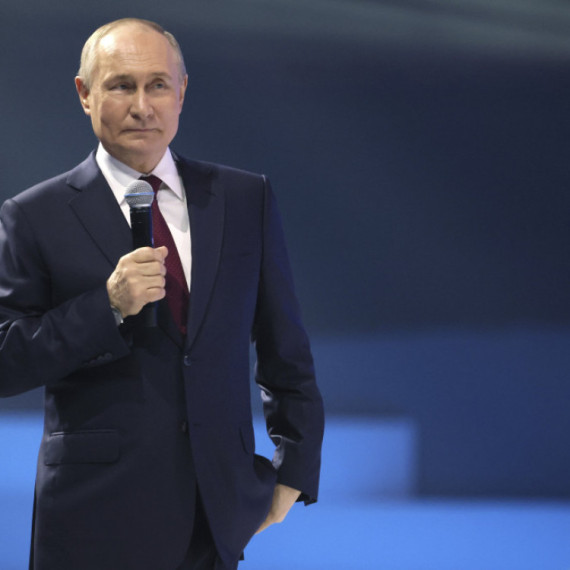Is multiethnic idea alive in Kosovo?
Belgrade Kosovo team member Goran Bogdanović says that multienthicity is a "non-existent category" in the province.
Sunday, 28.10.2007.
15:18

Belgrade Kosovo team member Goran Bogdanovic says that multienthicity is a "non-existent category" in the province. He was addressing a session devoted to Kosovo, a part of a seminar organized by NATO Parliamentary Assembly and the Serbian Parliament in Belgrade Saturday. Is multiethnic idea alive in Kosovo? Bogdanovic illustrated this by reminding of, in his words, more than 250,000 Serbs driven out of Kosovo since the arrival of the international community there in 1999. "The reality in Kosovo shows that the multi-ethnic composition of the province is extremely jeopardized," Bogdanovic said. In his opinion, the decentralization of power is a good approach to the resolving of the problem of Serbs in Kosovo, which are also "economically threatened". Pointing out that the international community stressed the solution for Kosovo would depend on its multiethnicity, he said this standard was not fulfilled, adding that the ethnic Albanian society was "not ready to accept Serbs as neighbors or colleagues." Bogdanovic concluded that the category of a multiethnic society in Kosovo is being used "as a means of propaganda for the realization of a political goal, namely, the independence of Kosovo." Social Sciences Institute Director Dusan Janjic also assessed that Kosovo is not multiethnic, as there is no cohabitation of ethnic communities, pointing to Kosovo's reality of confronted and divided ethnic communities. "In Kosovo, there a territorial conflict," said Janjic. At this stage of negotiations on the status of Kosovo, it is not possible to realize two goals, full independence and full integration of Kosovo into Serbia, he explained. In Janjic's opinion, the 14 points of the mediating Troika is a good way to create room for a future civilian mission of the international community in Kosovo and to proceed with negotiations on status without prejudging the outcome. "The EU, whether it likes it or not, must take over the mission, and that is why it is requesting a mandate through some kind of resolution," said Janjic, and added that the Serbian authorities "are facing a difficult challenge" to find a compromise and be very close to Russia, while at the same time cooperating with NATO. It is absolutely necessary, Janjic said, to establish a channel of cooperation which, in addition to Russia and NATO, will include other countries in the region. NATO Parliamentary Assembly meeting in Serbian Parliament (FoNet)
Is multiethnic idea alive in Kosovo?
Bogdanović illustrated this by reminding of, in his words, more than 250,000 Serbs driven out of Kosovo since the arrival of the international community there in 1999."The reality in Kosovo shows that the multi-ethnic composition of the province is extremely jeopardized," Bogdanović said.
In his opinion, the decentralization of power is a good approach to the resolving of the problem of Serbs in Kosovo, which are also "economically threatened".
Pointing out that the international community stressed the solution for Kosovo would depend on its multiethnicity, he said this standard was not fulfilled, adding that the ethnic Albanian society was "not ready to accept Serbs as neighbors or colleagues."
Bogdanović concluded that the category of a multiethnic society in Kosovo is being used "as a means of propaganda for the realization of a political goal, namely, the independence of Kosovo."
Social Sciences Institute Director Dušan Janjić also assessed that Kosovo is not multiethnic, as there is no cohabitation of ethnic communities, pointing to Kosovo's reality of confronted and divided ethnic communities.
"In Kosovo, there a territorial conflict," said Janjić.
At this stage of negotiations on the status of Kosovo, it is not possible to realize two goals, full independence and full integration of Kosovo into Serbia, he explained.
In Janjić's opinion, the 14 points of the mediating Troika is a good way to create room for a future civilian mission of the international community in Kosovo and to proceed with negotiations on status without prejudging the outcome.
"The EU, whether it likes it or not, must take over the mission, and that is why it is requesting a mandate through some kind of resolution," said Janjić, and added that the Serbian authorities "are facing a difficult challenge" to find a compromise and be very close to Russia, while at the same time cooperating with NATO.
It is absolutely necessary, Janjić said, to establish a channel of cooperation which, in addition to Russia and NATO, will include other countries in the region.


























































Komentari 10
Pogledaj komentare